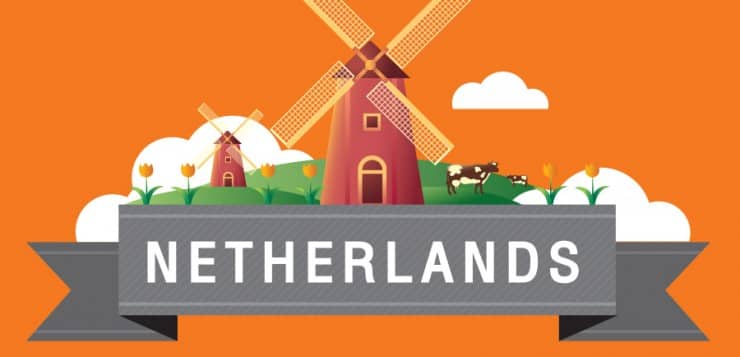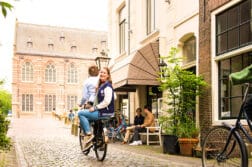Are you trying to decide whether you want to take on the adventure of studying abroad? Ever considered going to the Netherlands?
The Netherlands (more commonly referred to as Holland) has a lot more to offer than windmills, clogs and tulips. Its open culture and drive for innovation are also characteristic.
Canada and Holland have built up a long-lasting friendship, so why not make use of it? So what can you expect of Holland while studying here besides cheese from Gouda? And what about the Dutch education system?
Relations between Holland and Canada have been friendly for a long time, but the countries grew even closer when the First Canadian Army liberated Holland at the end of World War II. The Dutch king and queen recently visited Canada in the spirit of this relationship and to celebrate the 70th anniversary of the liberation of Holland. As part of the celebrations, scholarship programmes where set up for students from both countries.
About the Dutch
Despite the friendly relationship between the countries, you might not know all that much about Holland. The Dutch are known for windmills, tulips, cheese, and well, let’s say Amsterdam. But there is much more to know.
It is an open and liberal country. This is evident in the age-old exploring spirit of the Dutch, the long history of emigrations, and its advocacy of gay rights. Dutch society is multicultural and focused on international relations. The Dutch like to think of themselves as entrepreneurs and discoverers. Innovation and working on original ideas is stimulated by the government, evident in Dutch education too.
Why study in Holland?
- The Dutch have an open and interactive way of teaching.
- Holland is the third best country in terms of English proficiency in the world.
- The quality of Dutch universities is good. Multiple universities are mentioned in the top 100 of various rankings.
- Due to its geographic position, Holland is perfect for students who want to study abroad and see other parts of Europe as well.
The Dutch way of teaching
The Dutch teaching style is interactive and student-centred. It provides students with the attention and freedom they need to develop their own opinions and creativity in applying their
newly-acquired knowledge.
It focuses on teamwork, which makes it easy to meet other international students. Studying in Holland means developing an open mind and increasing your international orientation.
Holland has received international acclaim for its problem-based learning system, which trains students to analyze and solve practical problems independently through emphasis on self-study and self-discipline.
Do I have to learn Dutch?
The English proficiency of Dutch people is the third best in the world (excluding people from English-speaking nations) according to Education First (2013). This means you can easily socialize not only with your fellow students, but also Dutch natives. Furthermore, there are over 2,100 English-taught study programmes in more than 30 cities. With 80,000 international students, Dutch classrooms are becoming more and more international. You won’t be the only international student.
Higher education system
Holland has a binary education system, which means that you can choose from two types of degrees:
- research-oriented education, offered by research universities (BA/BSC/MA/MSC);
- higher professional education, offered by universities of applied sciences (B/M).
Dutch universities are of good quality. Multiple institutions are mentioned in both the Shanghai and QS top 100 rankings. Degree programmes offered by Dutch institutions are evaluated against a specific set of criteria, assessing the content and the level of the course.
The Dutch have identified nine key sectors in which Holland excels globally and that are a government priority. If you are studying in one of these fields it is especially interesting to study in Holland:
- Creative industries
- Chemicals industry
- Energy
- Agriculture and food
- Life sciences & health
- High tech systems & materials
- Horticulture
- Logistics
- Water management
Student life
All the big universities in student cities organize introduction weeks at the end of August. During this week, students (both international and Dutch) explore the city and get to know their fellow students. The biggest student cities in the Netherlands are Amsterdam, Utrecht, Rotterdam, Groningen, Nijmegen, Leiden, and Maastricht.
All student cities have student associations. There is also a student association especially for international students that is active in multiple cities: ESN.
Travelling
Once you have arrived in Holland, you will discover that many European capitals are within easy reach. Berlin, Brussels and Paris are just a few hours away by train, and a short flight from Amsterdam Airport Schiphol will take you to London, Madrid or Rome.
Travelling within the country is easy. You don’t really need a car to get around in Holland. The bicycle is the cheapest and easiest way to get around, especially if you live in a city. Traveling from city to city is done by train. Holland is a small country and public transport will take you almost anywhere you want to go.
Money matters
Money is an important factor when it comes to studying abroad. You want affordable and good quality education. The average annual tuition fee for study programmes starts at approximately €6,000 for non-EU students.
The cost of living in the Netherland is about C$1,400 a month. This includes housing, insurance, food, public transport, books, clothes, and leisure expenses such as cinema tickets.
In celebration of Canada liberating the Dutch 70 years ago, the Liberation Scholarship Programme was set up. You can apply for this until 1 October 2015. If you don’t make this deadline, check the recently-launched Holland Scholarship Programme for non-EU/EEA students, which grants an amount of €5,000 to selected candidates. For more details on this and other scholarship programmes go to www.grantfinder.nl.
For more information about studying in Holland, please visit our website www.studyinholland.nl.
Contributed by:
NUFFIC
Study in Holland is an initiative of EP-Nuffic to promote and inform students about Dutch higher education worldwide. Study in Holland is the starting point for all international students who are considering Holland as a study destination.







